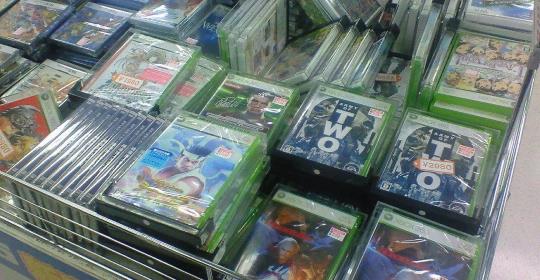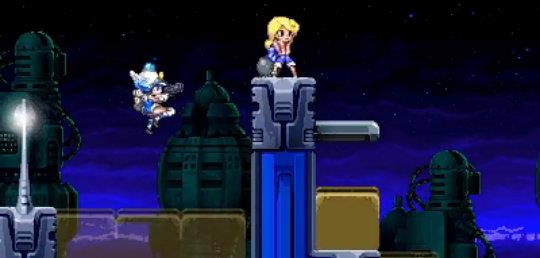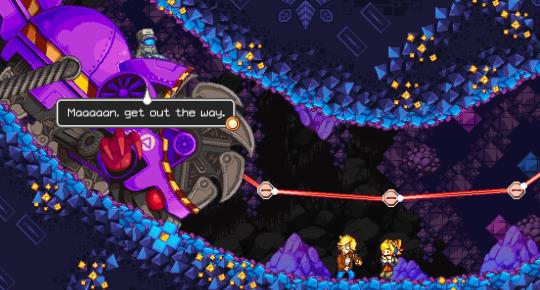Never-Ending Consumption

It was a little more than five years ago that a blog I had written was promoted to Destructoid’s front page. After two years with an abundance of professional-grade income I found myself capable of purchasing any game that twitched the richter-scale of my mind, no matter how small the tremor of interest in my heart. This resulted in an abundance of games and a need to keep playing the next thing, and if I ever retread old ground I’d feel guilty.
Despite having “penned” the promoted blog myself, it is as if the lessons came to be forgotten as time had passed on. I’m rediscovering them as if they are new, finally allowing myself the pleasure to revisit old titles last year. As can be seen in my monthly report, I’ve only recently begun to apply these revelations to my approach to making videos.
Which, perhaps, keys in to part of the problem. I fancy myself a games critic, and a games critic must play games! Every game must be played, and each game must be critiqued. This is the nature of it, is it not?
One of my “resolutions” for 2018 was that I’d play more indie games than I have in prior years. There’s a lot of excellent independent talent out there, many of whom are crafting experiences that strike the gold vein of my childhood foundations. Even so, bigger, more expensive titles often foreshadow these poor, unfortunate indie souls. Ultimately I do not see them behind the colossi of the industry, walking passed them despite their promise.
On the final day of January, I played to completion two separate indie games. Mighty Switch Force by WayForward and Iconoclasts by Joakim “Konjak” Sandberg. The latter is a game I wish to revisit and perhaps even make a video on – because what don’t I wish to make a video on these days?* – while the former was played, enjoyed, and will be left behind.
It suddenly struck me in that moment that my treatment of Mighty Switch Force not only betrayed a lot of my growing beliefs, but my intentions as a critic.

I was effectively playing Mighty Switch Force to check off a box. Or more accurately, I was doing so once I found out it was more of a puzzle game than a spiritual successor to Mega Man X. The initial screenshot and trailer gave me the impression that I’d be exploring an adventure in the style of the Blue Bomber, an expectation that was swiftly dismissed once I had completed just a few levels. It’s not an action game but a puzzle-platformer, and to that end it is a surprisingly good one.
However, I was only playing it to have another indie under my belt and mark it as “complete”. An entirely consumption-based mentality that only absorbed the most superficial elements of the game and failed to study its greater depths and designs.
In the span of only a few years my impression of what it took to become a games writer had poisoned me with bad habits and preconceived notions. I’ve been failing to treat each piece of media I dedicate time to as a proper piece of art. Each level of Mighty Switch Force concludes with a “Par Time”, and tests to see if you managed to meet or beat that time. You don’t lose anything for taking longer than par, no fail state for taking twice or thrice as long as they challenge. However, it’s clear that the designers intended for players to find optimal routes, to improve their timing, learn the levels, and beat Par.
I reflexively look down upon those that play the same match-three puzzler on their mobile phones and tablets for ignoring the wider world of games available to them. They seem to me as fish caught on the baited hook of companies eager to squeeze what pocket change is available in their coats, jeans, and purses. Instead I should be celebrating the fact that these players are at least investing in a game whose developers spent a lot of time on while I, a supposed enthusiast game player with respect for this industry, mentally disposed of a game after seeing the credits roll.
Such bad habits are a result of many factors. All media industries at this time are focused on advertising “the next big thing”. All, except perhaps Netflix. I’ve noticed with many of their television advertisements they’ll include original content both new to their service and old. You’ll certainly see new and big splashes like Stranger Things, but you’ll also see Orange is the New Black. It’s possible this is because Netflix became a streaming success once a series of older shows and films were available to binge-watch. Certainly, its early days were viewed barren of quality and bursting with mediocrity, but once television shows were added subscribers found themselves digging in for marathon sessions of viewing.
The old was new again.

Now, there’s still a consumption level attitude surrounding Netflix and its TV binge-ing. Jokes are made about that empty feeling completing a show, a hollow cavern in the soul that can only be filled by a new binge-worthy show. Nevertheless, there’s still some intrinsic and artistic value found in the old. In fact, as an aside tangent, maybe the best thing Netflix could do to save select anime from licensing Hell is to invest in them as exclusives to the service. Imagine if Netflix secured exclusive rights to the director’s cut of Neon Genesis Evangelion?
Okay, this line has gotten tangled in the weeds. Time to reel it back in.
My greater point is that it’s fine and good to have the desire to play more indies, but if all I’m going to do is treat me no different than a checklist then I’m not truly appreciating those games. Perhaps as a standard consumer this isn’t a problem, but I call myself a critic. If I’m going to more closely analyze these games then simply consuming them isn’t enough; in fact, it’s outright disrespectful.
Granted, not every game requires multiple playthroughs. Dozens of hours spent on a single run may be enough to gain the insight necessary to break down what makes the game work and why. Do I really understand Mighty Switch Force, though? Especially as I haven’t even tried the bonus levels that unlock once credits roll?
I do not trust myself to be able to write a proper analysis of Mighty Switch Force. In that case, what have I really done for the creators? Have I spread the benefits of this game to others? Or have I merely given them a cursory glance and tossed them aside to make room for the next game?
While not ideal, Mighty Switch Force at least stands as a lesson learned. Now I can better evaluate potential purchases as the months pass by, resisting temptations that will only clutter my pile while focusing on the games causing my interest levels to quake. It may not be the value WayForward had intended, but it is valuable nonetheless.
* Evidently anything but the video I’m working on.


